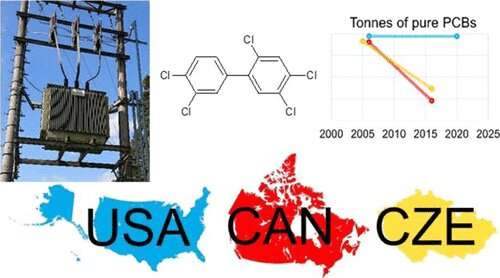Graphical abstract. Credit: Environmental Science & Technology (2022). DOI: 10.1021/acs.est.2c01204
A new analysis by researchers at Masaryk University, the University of Toronto, and NRDC (Natural Resources Defense Council) has found most countries are not on track to remove their stocks of highly hazardous polychlorinated biphenyls (PCBs) by the 2028 deadline set forth in the Stockholm Convention, the global chemicals management treaty. The report found more than 10 million tons of PCB-containing materials remain and pose public health and environmental threats globally.
Additional findings from the report "Persistent Problem: Global Challenges to Managing PCBs," published in the journal Environmental Science & Technology, include:
- 42% of signatories to the Stockholm Convention are unaware of the amounts and locations of PCB stocks in their country.
- Only 30% of signatories to the Stockholm Convention are on track to meet the target of environmentally sound management of all PCBs by 2028.
- A lack of administrative, financial, and political capacities are key impediments to successfully managing PCB stocks, especially in low-income countries, despite these countries not being responsible for most PCB production or use.
- The U.S., the world's largest producer and user of PCBs, was found to have decreased its sizable stocks by only about 3% since 2006. Despite having the financial capacity to responsibly eliminate PCBs, the U.S. has no regulatory deadlines to do so, is not a party to the Stockholm Convention, and its PCB inventory is poorly documented compared to Canada and Czechia.
- The inability of global agreements like the Stockholm Convention to effectively manage PCBs bodes poorly for the management of other toxic chemicals that are found in myriad products, like the highly persistent PFAS (per-and poly fluoroalkyl substances) and chlorinated paraffin chemicals.
PCBs are persistent organic pollutants and carcinogens and were widely used for their insulating and flame retardant properties. PCBs were banned in the late 1970s by many countries, including the U.S. and Canada, but the chemicals are still present in transformers, capacitors, and building materials in many countries.
"We're only six years out from the Stockholm Convention's deadline to responsibly eliminate PCB stocks, but shockingly little progress has been made," says Lisa Melymuk, assistant professor of environmental chemistry, Masaryk University.
"With effective regulations and good governance, Canada has successfully managed and destroyed its PCB stocks. However, evidence suggests that Canada has not applied this 'lesson learned' for PCBs to other highly hazardous chemicals," says Miriam Diamond, professor, Department of Earth Sciences and School of the Environment, University of Toronto.
"Global mismanagement and inequities make elimination of these persistent chemicals unlikely. This analysis is an international wake-up call to limit the production of hazardous chemicals, like PCBs. We just can't clean up the mess that they create," says Veena Singla, senior scientist, NRDC.
More information: Lisa Melymuk et al, Persistent Problem: Global Challenges to Managing PCBs, Environmental Science & Technology (2022). DOI: 10.1021/acs.est.2c01204
Journal information: Environmental Science & Technology
Provided by University of Toronto
























